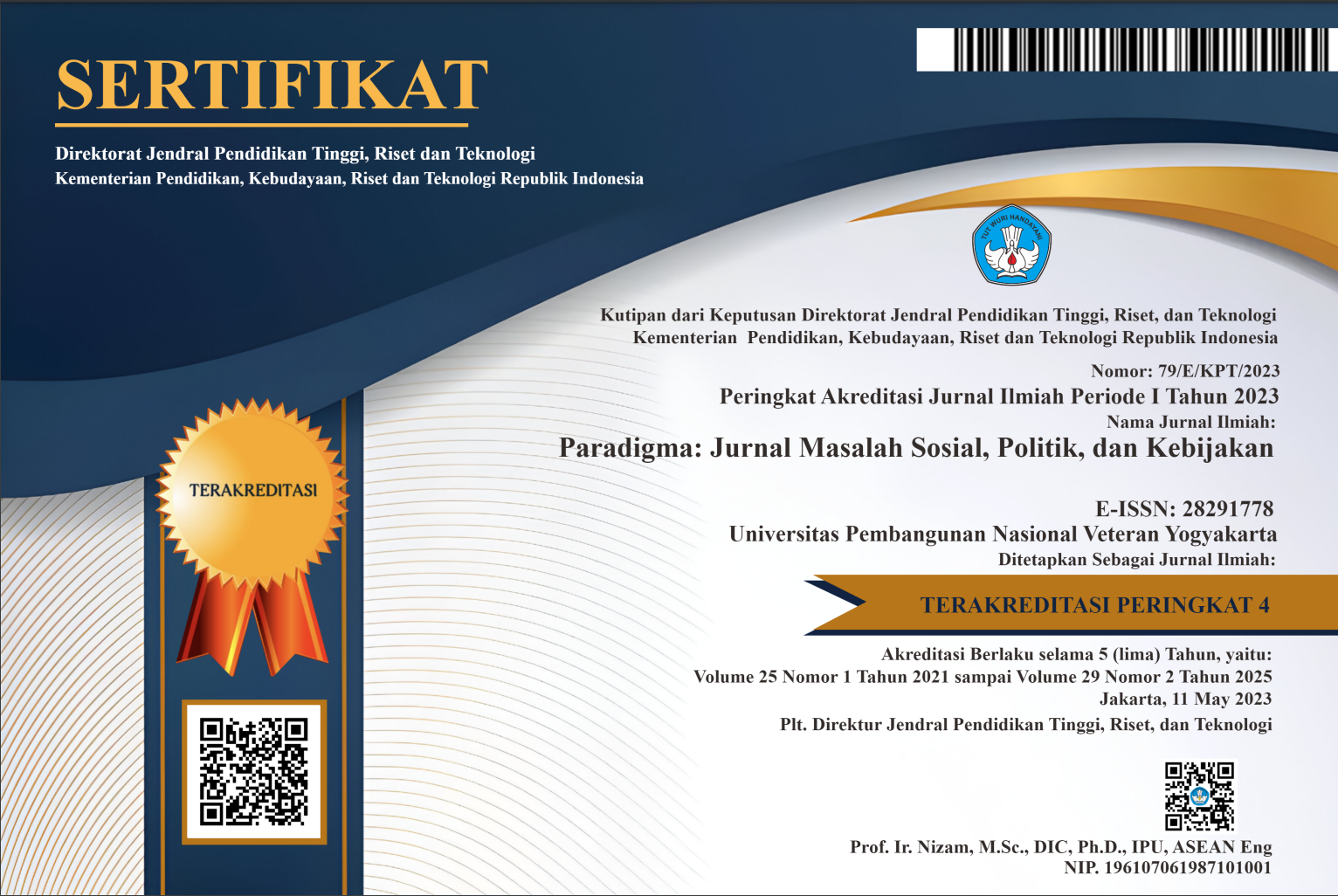KEPENTINGAN TURKI DALAM MoU DELIMITASI MARITIM DENGAN LIBYA DI LAUT MEDITERANIA TIMUR
Abstract
Turki-Libya sepakat menandatangani MoU delimitasi zona maritim mereka di Laut Mediterania Timur pada 2019. Namun, persoalan justru timbul dari negara-negara lain di kawasan dengan menolak disahkannya perjanjian ini, karena akan berpotensi mengganggu aktivitas kemaritiman mereka. Penelitian ini bertujuan untuk meneliti kepentingan yang melatar belakangi Turki menandatangani MoU delimitasi maritim di Laut Mediterania Timur dengan Libya tahun 2019. Penelitian ini menggunakan metode kualitatif dengan teknik pengumpulan data studi kepustakaan melalui buku, dokumen, artikel jurnal, dan website. Penelitian dikaji menggunakan konsep Kepentingan Nasional Jack C Plano & Roy Olton untuk menggambarkan kepentingan yang ingin dicapai Turki dalam penandatanganan MoU delimitasi maritim dengan Libya. Hasil penelitian menunjukkan kepentingan Turki yaitu adanya kepentingan pertahanan diri/self-preservation berkaitan dengan dinamika keamanan di lingkungan kawasan, kepentingan intagritas wilayah/territorial integrity berupa landasan hukum yang sah atas klaim wilayah maritimnya di Laut Mediterania Timur, dan kepentingan kemakmuran ekonomi/economic well-being guna menghadang rencana proyek pemasangan pipa East-Med. Sehingga, dapat ditemukan kesimpulan bahwa penandatanganan MoU delimitasi maritim dengan Libya dilakukan Turki guna mengamankan kepentingannya atas wilayahnya di Laut Mediterania Timur.
Keywords
Full Text:
PDF (Bahasa Indonesia)References
Buku
Caflisch, Lucius. 1991. The Delimitation of Maritime Spaces Between States with Opposite and Adjacent Coasts: A Handbook on the New Law of Sea. Dordrecht: Nijhoff.
Ebert-Stiftung, Friedrich. Hlm 6 (2020). Libya: A Failed State in The Middle of Mediterranean. Barcelona: IEMed.
IEA. 2021. Turkey 2021 Energy Policy. Paris: IEA.
Ioannides, Nicholas A. 2021. Maritime claims and boundary delimitation: tensions and trends in the eastern Mediterranean Sea. New York: Routledge.
Plano, Jack C., & Roy Olton. 1999. The International Relations Dictionary 4th editions. Oxford: Clio Press.Ltd.
Pirinççi, Ferhat. 2021. Turkey’s Eastern Mediterranean Policy: A Geopolitical Assessement. Istanbul: SETA.
Stanicek, Branislav. 2020. Turkey Remodeling the Eastern Mediterranean: Conflicting Exploration of Natural Gas Reserves. Brussels: EPRS.
Stergiou, Andreas. 2019. “Geopolitics And Energy Security in Theeastern Mediterranean: Theformation of New Energy Alliances” dalam Zeonas Tzearras (ed) The New Geopolitics of the Eastern Mediterranean: Trilateral Partnerships and Regional Security. Oslo: friedrich-ebertstiftung.
Talbot, Valeria. 2021. The Scramble for The Eastern Mediterranean: Energy and Geopolitics. Milan: Ledizioni Ledi Publishing.
Uzgel, İlhan. 2020. Turkey and the Mediterranean Imbroglio: the story of an aspiring regional power. Beirut: Friedrich Ebert-Stiftung.
Yahchouchi, Romy. 2021. Maritime Security in the Mediterranean Sea. Tunis: Konrad Adenauer Stiftung.
Jurnal
Acer, Yucel. 2021. “Turkey’s Legal Approach to Maritime Boundary Delimitation in Eastern Mediterranean Sea” Insight Turkey. Vol 23 no 1 hlm 99-114
Axt, Heinz-Jurgen. 2021. “Troubeld Water in The Eastern Mediterranean. Turkey Challenges Greece and Cyprus Regarding Energy Resources” policy analysis. Vol 69 no 1 hlm 133-152
Bardakçı, Mehmet. 2022. “Turkey and the Major Powers in the Eastern Mediterranean Crisis from 2010s to the 2020s” Leibniz Institute for East and Southeast European Studies. Vol 70 no 3 hlm 516-539
Başeren, Sertaç Hami. 2021. “Root Causes of the Eastern Mediterranean Dispute: Approaches of the Main Actors” insight Turkey. Vol 23 no 1 hlm 11-22
Biresselioglu, Mehmet Efe. 2019. “Clashing Interest in The Eastern Mediterranean: What About Turkey?” insight turkey vol 21 no 4 hlm 115134
Corten, Olivier. 2011. “Territorial Integrity Narrowly Interpreted: Reasserting the Classical Inter-State Paradigm of International Law”. Leiden Journal of International Law. Vol 24 no 1, 87–94. doi:10.1017/s092215651000061
Ece, Nur Jale. 2017. “The exclusive economic zone in the eastern Mediterranean: delimitation agreements, stakeholders, and strategies” JEMS Maritime Science vol 5 no 1 hlm 81-94
García-Carriazo, Á. J. 2021. “The Maritime Delimitation between Turkey and the Libya’s Government of National Accord: Another Concern for the European Union?” Paix Et Securite Internationales, vol 9 no. 9, 1–24. DOI:10.25267/Paix_secur_int.2021.i9.1201
Gunawan, Yordan, dkk. 2020. “The Validity of Turkey-Libya Agreement on Maritime Boundaries in International Law” Jurnal Hukum Peradilan. Vol 9 no 2
Demiryol, Tolga. 2019. “Between Security and Prosperity: Turkey and The Prospect of Energy Cooperation in The Eastern Mediterranean.” Turkish Studies, vol 20 no 3 hlm 442-464. doi: 10.1080/14683849.2018.1534204
Oral, Ferhan. 2021. “Is the Crisis in the Eastern Mediterranean about Energy or Sovereignty” Mayis. Vol 5 no 1 hlm 219-247
Silove, Nina. 2017. “Beyond the buzzword: the three meaning ofgrand strategy” security studies vol 27 no 1 hlm 27-5
Tanchum, Michael. 2015. A New Equilibrium: The Republic of Cyprus, Israel, and Turkey in the Eastern Mediterranean Strategic Architecture. Oslo: PRIO.
Winrow, Gareth M. 2016. “The Anatomy of A Possible Pipeline: The Case of Turkey And Leviathan And Gas Politics In The Eastern Mediterranean” Journal of Balkan And Near Eastern Studies vol 18 no 5 hlm 431-447
Yayla, Ahmet S. 2020. “Erdogan’s Libyan Adventure: Turkey, Russia, Gas Pipelines and Missiles” investigative Journal. Vol 1 no 13 hlm 1-4
Artikel Internet
Altunışık, Meliha Benli . 2020. “Turkey’s Eastern Mediterranean Quagmire” https://www.mei.edu/publications/turkeys-eastern-mediterraneanquagmire diakses tanggal 10 Maret 2023
Bloch, Agneska., & Israa Saber. 2021. “What’s Driving the Conflict in the Eastern Mediterranean?” https://www.lawfaremedia.org/article/whats-driving-conflict-eastern-mediterranean diakses pada 2 Oktober 2022
Daily Sabah. 2020. “UN Certifies Turkey-Libya Maritime Delimitation Agreement” https://www.dailysabah.com/politics/diplomacy/un-certifies-turkeylibya-maritime-delimitation-agreement diakses tanggal 1 Desember 2022
ICJ. 1981. “Delimitation Of The Maritime Boundary In The Gulf Of Marine Area (Canada/United States Of America)” https://www.icj-cij.org/en/case/67 diakses tanggal 16 Februari 2023
MFA Turkey. 2022. “Turkiye’s International Energy Strategy” https://www.mfa.gov.tr/turkeys-energy-strategy.en.mfa diunduh tanggal 2 Mei 2023
Seufert, Günter. 2020. “Turkey Shift the Focus of Its Foreign Policy” SWP Turkey Shifts the Focus of Its Foreign Policy: From Syria to the Eastern Mediterranean and Libya (cats-network.eu) diakses tanggal 2 Mei 2023.
UN. 2019. “Memorandum of Understanding between th Government of the Republic of Turkey and the Government of National Accord-State of Libya on Delimitation of the Maritime Juridiction Areas in the Mediterranean” https://treaties.un.org/Pages/showDetails.aspx?objid=080000028056605a diakses tanggal 13 Oktober 2022
UN. 2020. “UN Certifies Turkey-Libya Maritime Delimitation Agreement” https://www.dailysabah.com/politics/diplomacy/un-certifies-turkeylibya-maritime-delimitation-agreement diakses tanggal 1 Desember 2022
DOI: https://doi.org/10.31315/paradigma.v28i1.11407
Refbacks
- There are currently no refbacks.
Copyright (c) 2024 Umi Salamah, Muharjono Muharjono

This work is licensed under a Creative Commons Attribution-ShareAlike 4.0 International License.
Paradigma: Jurnal Masalah Sosial, Politik, dan Kebijakan
Published by Faculty of Social Science and Political Science
Universitas Pembangunan Nasional "Veteran" Yogyakarta
(Kampus Unit II) Jl. Babarsari 2, Tambakbayan, Depok, Yogyakarta 55281
Phone: +62 274 486733. Email: paradigma@upnyk.ac.id

This work is licensed under a Creative Commons Attribution-ShareAlike 4.0 International License.



